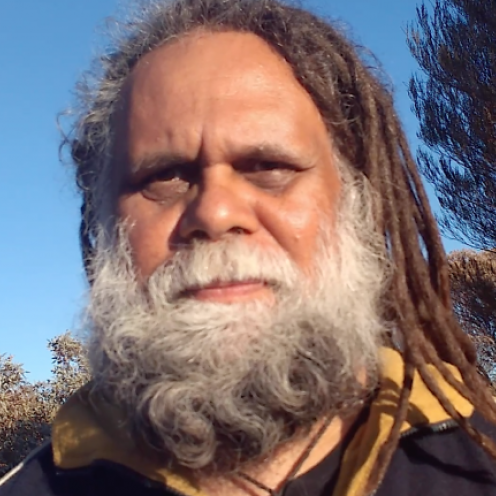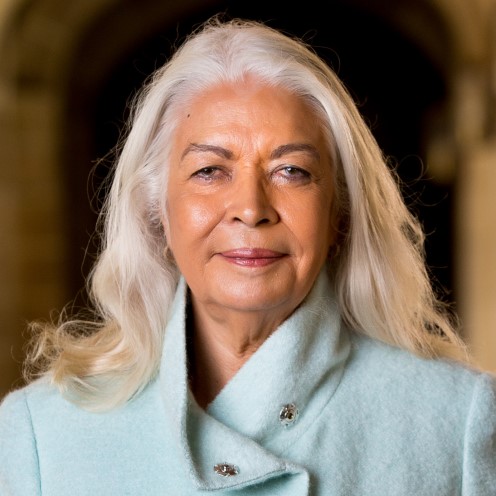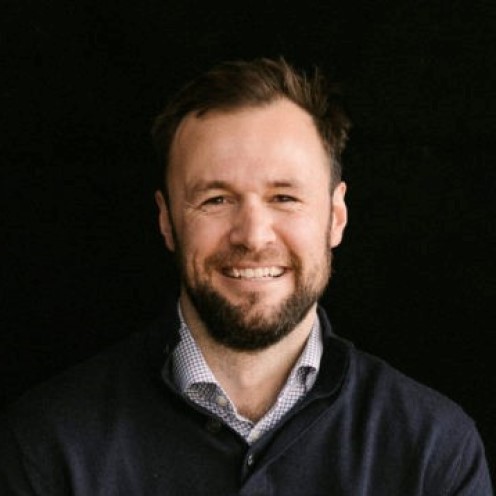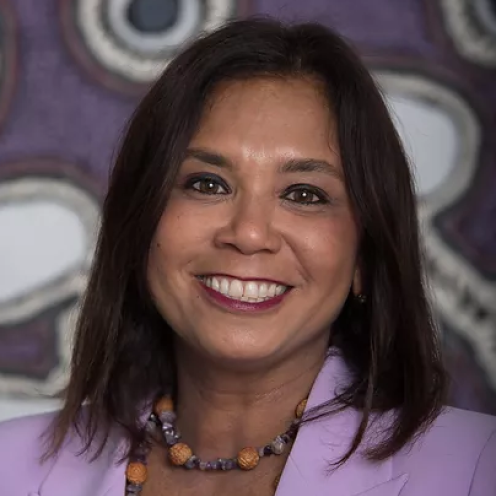On Thursday 26 November, Traditional Owners from across Australia explored the practical and legislative framework that should protect Aboriginal and Torres Strait Islander Cultural Heritage.
With the release of Dhawura Ngilan - a vision for Aboriginal and Torres Strait Islander heritage in Australia and the Best Practice Standards in Indigenous Cultural Heritage management and legislation, the event explored what best practice looks like in the current environment. With clear examples of where legislation has failed and where good laws could be better, our esteemed panellists explored the need for and prospects of change.
This live digital event provided 140 live stream attendees an in-depth exploration of Traditional Owner perspectives, live audience question time and an opportunity for greater networking with other attendees.
This event was presented by the Victorian Aboriginal Heritage Council with the National Native Title Council and the University of Melbourne.
Our panellists

Kado Muir is Deputy Chair of the NNTC. He is a Ngalia Traditional Owner and a Wati – a Goldfields Aboriginal cultural and community leader, and an anthropologist/archaeologist with many years’ experience working in Aboriginal heritage, language preservation and maintenance, traditional ecological/education and native title research.
Kado is also Chair of the Wakamurru Aboriginal Corporation RNTBC, the PBC for Manta Rirrtinya Native Title Determination and the former founding CEO of the Goldfields Land and Sea Council. He also operates a number of businesses including an Aboriginal art business, a Sandalwood company, and a heritage consultancy business. He is a long-time activist for bi-lingual and two way education, environmental and cultural heritage protection and promoting alternative community based enterprises, especially through his PhD university partnerships for research on Wealth in First Nations.

Liz is a Victorian Aboriginal woman, descending from Wurundjeri Woiwurrung and Dja Dja Wurrung, she was born and raised on Gunaikurnai country and has extended family connections throughout Gippsland.
An Aboriginal advisor, with over 20 years of professional experience with Community, Industry and Government services, Liz is driven to further the inclusion of Aboriginal Economic participation.
She has worked extensively in government to strengthen the Aboriginal business sector empowering a prosperous Aboriginal and Victorian economy for generations to come and as an active member of the Victorian Aboriginal Heritage Council, Dja Dja Wurrung Clans Aboriginal Corporation and Wurundjeri Woi-Wurrung Clans Heritage Council Aboriginal Corporation.

Professor Marcia Langton AM is an anthropologist and geographer, and since 2000 has held the Foundation Chair of Australian Indigenous Studies at the University of Melbourne. She has produced a large body of knowledge in the areas of political and legal anthropology, Indigenous agreements and engagement with the minerals industry, and Indigenous culture and art. Her role in the Empowered Communities project under contract to the Department of Prime Minister and Cabinet and as a member of the Expert Panel on Constitutional Recognition of Indigenous Australians are evidence of Professor Langton's academic reputation, policy commitment and impact, alongside her role as a prominent public intellectual.
Her 2012 Boyer lecture series titled The Quiet Revolution: Indigenous People and the Resources Boom is one of her recent contributions to public debate, and added to her influence and reputation in government and private sector circles. In 1993 she was made a member of the Order of Australia in recognition of her work in anthropology and the advocacy of Aboriginal rights.
Professor Langton is a Fellow of the Academy of Social Sciences in Australia, a Fellow of Trinity College, Melbourne and an Honorary Fellow of Emmanuel College at the University of Queensland. In 2016 Professor Langton was honoured as a University of Melbourne Redmond Barry Distinguished Professor. In further recognition as one of Australia’s most respected Indigenous Academics, Professor Langton has in 2017 been appointed as the first Associate Provost at the University of Melbourne.

Matthew Burns is the CEO of Taungurung Land & Waters Council and a Taungurung man. He is also a Director of Federation of Victorian Traditional Owner Corporations and Goulburn Valley Water Corporation and an elected member for the metropolitan region on the First Peoples Assembly of Victoria, the body which operates as the voice for Aboriginal communities across the state, representing them in the next phase of the Treaty process.

Dr Terri Janke is a Wuthathi/Meriam woman and an internationally recognised authority on Indigenous Cultural and Intellectual Property (ICIP), known for innovating pathways between the law and the cultural heritage rights of Indigenous peoples and communities.
Terri Janke and Company has written leading ICIP protocols for various sectors including the arts, museums, archives, film and business. Publications include landmark publications include Our Culture: Our Future (1998), IP Australia’s Indigenous Knowledge: Issues for protection and management (2018) and First Peoples: a roadmap for enhancing Indigenous engagement in museums and galleries (2019).
The Office of the Victorian Aboriginal Cultural Heritage Council has commissioned Terri Janke and Company to produce a report of the State of Victorian Aboriginal Cultural Heritage, due in 2021.
Resources and presentations
Dhawura Ngilan: A vision for Aboriginal and Torres Strait Islander heritage in Australia and the Best Practice Standards in Indigenous cultural heritage management and legislation:
Access via the Australian Department of Agriculture, Water and the Environment website
- Australian Government information on identifying World Heritage
- UNESCO Operational Guidelines for the Implementation of the World Heritage Convention
- UNESCO manual on preparing World Heritage nomination
- Indigenous Communities Guide to the National Heritage List
- Engage Early - guidance for proponents on best practice Indigenous engagement for environmental assessments under the Environment Protection and Biodiversity Conservation Act 1999 (EPBC Act)
- World Heritage Nomination – Budj Bim Cultural Landscape (Video)
- Budj Bim – Gunditj Mirring Traditional Owners Aboriginal Corporation
- Budj Bim Nomination Dossier
Click to see the presentation by Matthew Burns:
Presentation by Matthew Burns(opens in a new window)PDF 2.14 MBPlease click to read the presentation by Dr Terri Janke:
Presentation by Dr Terri Janke(opens in a new window)PDF 1.4 MB"Thanks to all of the panelists. Really appreciate having the opportunity to listen to your views and ideas!"
"Thank you for being generous in sharing your time, knowledge, insights and truth."
"Thank you very much all for a great session!"
"Thank you to all the panelists, really great discussion! Looking forward to the conference next March."
"Thank you all for such an insightful session, tuning in from Wadawurrung Country."
"Very much the same issues across Australia with cultural heritage management, appreciate all of the panelists efforts in contributing to mending gaps!"
"Thank you for an excellent session - extremely informative and helpful."
"Thank you for another excellent panel discussion. Consultation for Aboriginal Cultural Heritage law reform has been going on in NSW since 2011 yet recent draft bill still fell drastically short of meeting the needs of real power being given to cultural heritage protection. Like unc just said 'no meat on the bones'... the laws here are a toothless tiger."
"Same story in NSW, when Sandon Point case went to court, NSW Government were asked how many consents to destroy were issued versus how many were rejected - hundreds issued, zero rejected."
Updated

